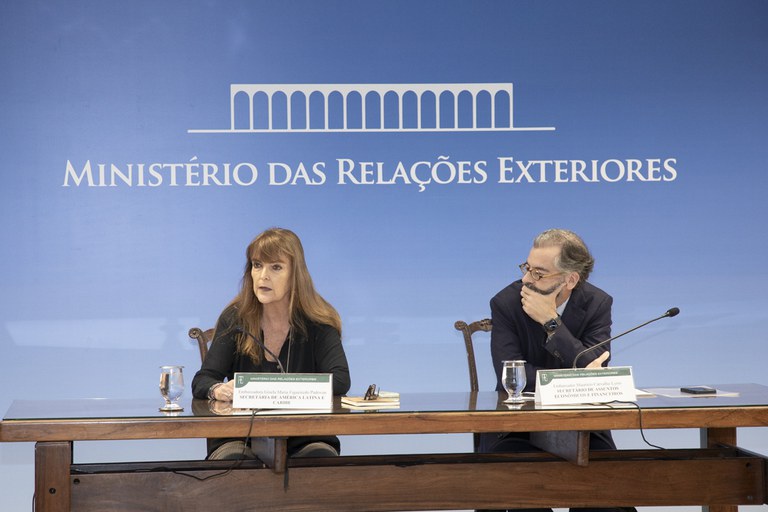
Published 03/12/2024 14:46 | Edited 12/03/2024 15:19
Bolivia debuts as a full member of Mercosur during the bloc’s 65th Summit of Heads of State, which will be held on December 5th and 6th in Montevideo, Uruguay. The country’s official entry, which took place in August this year, marks an important step towards the strengthening and expansion of Mercosur, which now covers 73% of the territory, 65% of the population and 70% of the Gross Domestic Product of South America. The summit also signaled the expansion of the bloc’s borders beyond South America, with the accession of Panama as an Associated State.
Bolivia’s participation significantly increases Mercosur’s geographic and economic relevance. According to the secretary for Latin America and the Caribbean at the Ministry of Foreign Affairs, Gisela Padovan, the bloc now covers a territory equivalent to the second largest country in the world and brings together around 300 million people.
“With Brazil, Argentina, Bolivia, Paraguay, Uruguay, we have 73% of the territory of South America in Mercosur. It would be the second largest country in the world in terms of territory. There are almost 300 million inhabitants, which is equivalent, more or less, to the United States. Just to give a dimension of this entry from Bolivia. And 70% of the region’s GDP. This expansion of the population area, of Mercosur’s reach, is quite relevant,” explained Padovan during a press briefing this Monday (2) at the Itamaraty Palace.
The country’s accession reflects the consolidation of Mercosur as an essential platform for regional integration, with impacts ranging from trade to social and environmental policies.
Panama’s accession
Another highlight of the summit will be the formalization of Panama’s entry as an Associated State. The country will sign three agreements: the Economic Complementation Agreement 76 (ACE-76), the Ushuaia Protocol on Democratic Commitment and the Presidential Declaration on Democratic Commitment. This inclusion marks the first time that Mercosur expands its borders to Central America.
“Panama is Brazil’s main trading partner in Central America. It is the first Central American country to join this group of associates. Once these three agreements are signed, it will be eligible for the same portfolio of bilateral and regional agreements as Mercosur, expanding the scope of the bloc beyond South America,” stated Padovan. The movement reflects the growing interest of Central American countries, such as El Salvador and the Dominican Republic, in getting closer to the bloc.
Economic and commercial relevance of Mercosur
Mercosur continues to be one of the main mechanisms of economic integration on the continent. Intra-bloc trade has shown significant growth since its foundation, jumping from R$4.5 billion in 1991 to R$49 billion in 2023. During this period, Brazil exported R$23.5 billion to member countries, with high value-added products representing 82% of the total. This dynamic is seen as an important driver for the generation of jobs and income.
From January to October 2024, trade exchange in the bloc totaled US$32.5 billion, with Brazil recording a surplus of US$537.8 million. Brazilian exports include passenger and merchandise vehicles, parts and accessories for these vehicles, other products from the manufacturing industry, iron ore, among others.
The practical benefits of integration go beyond trade. The free movement of people, the recognition of social security rights and the approval of university degrees are some of the advances provided by Mercosur. “If you cross borders with just your identity card or can retire in another country, that is Mercosur”, emphasized Padovan.
Global negotiations and strategic integration
In addition to internal advances, Mercosur seeks to intensify its presence on the international scene. The agreement with the European Union is one of the priorities in external negotiations, which also involves the European Free Trade Association (EFTA) and the United Arab Emirates. According to Ambassador Mauricio Carvalho Lyrio, Secretary of Economic and Financial Affairs, these agreements have not only economic relevance, but also political relevance, as they promote values such as democracy and sustainability in a challenging global context.
“We are seeing the development of negotiations positively. President Lula himself has already mentioned the expectation that negotiations will be concluded by the end of the year. I have also said that this has a meaning beyond the commercial, because it also has a very considerable political importance, at this time of conflicts, recurring antagonisms, protectionism, unilateral threats and so on”, said the secretary.
__
with information from the Federal Government
Source: vermelho.org.br

